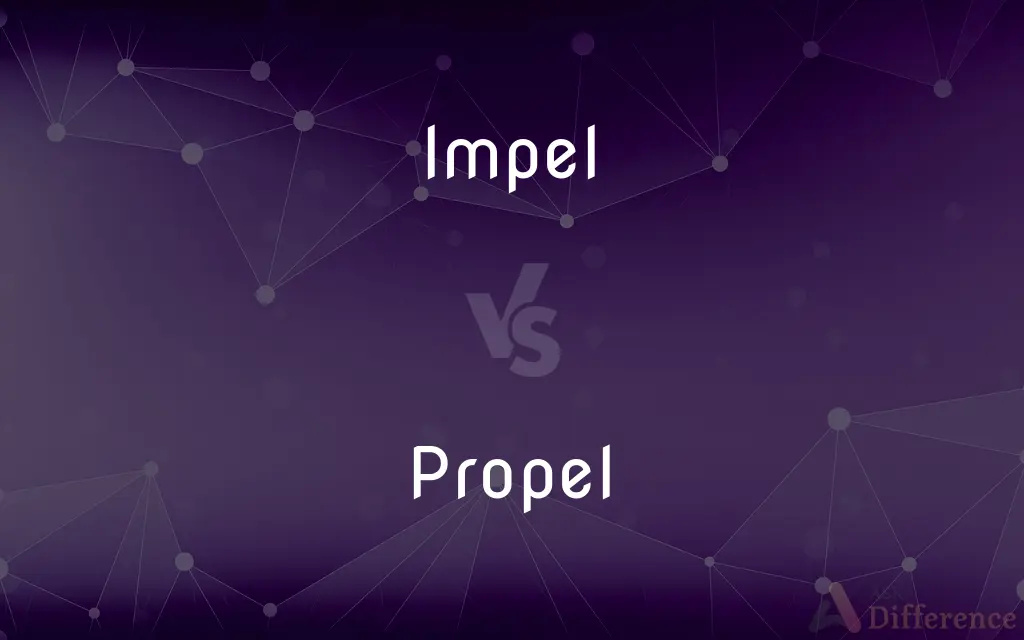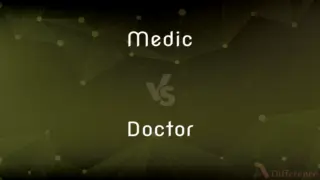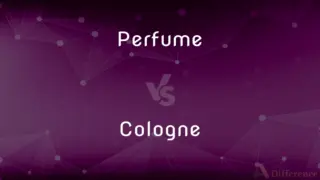Impel vs. Propel — What's the Difference?
By Fiza Rafique & Urooj Arif — Updated on March 15, 2024
Impel involves urging or driving forward, often from within, as a moral or emotional force, while propel means to push or move something in a particular direction, typically from an external force.

Difference Between Impel and Propel
Table of Contents
ADVERTISEMENT
Key Differences
Impel is often associated with an internal drive or motivation that causes someone to take action. This could be due to moral, emotional, or intellectual stimuli. Whereas, propel is generally used in contexts where an external force is applied to an object or person to cause movement. This force can be physical, mechanical, or even situational.
Impel can be seen in scenarios where personal conviction or a sense of duty compels an individual to act. This action is more about a psychological or emotional push. On the other hand, propel is more about a physical or tangible force causing movement or progress, such as wind propelling a sailboat.
Impel often carries a more metaphorical or abstract sense, implying actions taken due to internal urges like conscience, desires, or responsibilities. In contrast, propel is more concrete, usually involving physical forces or actions that cause something or someone to move in a specific direction.
In the realm of personal development or motivation, impel refers to the inner forces that drive a person towards goals or changes, like ambition or ethical obligations. Meanwhile, propel might be used to describe external factors or interventions that help move an individual towards their goals, such as mentorship or resources.
When discussing narrative or storytelling, characters may be impelled by their beliefs, desires, or circumstances to embark on a journey or face challenges. Conversely, they might be propelled into situations or actions by external events, other characters, or unforeseen forces.
ADVERTISEMENT
Comparison Chart
Force Origin
Internal (emotional, moral)
External (physical, situational)
Context
Psychological, motivational
Physical, mechanical
Connotation
Metaphorical, abstract
Concrete, literal
Common Usage
Personal motivation, ethical actions
Movement caused by physical forces
Examples
Sense of duty, personal conviction
Wind pushing a boat, a motor moving a car
Compare with Definitions
Impel
To drive or urge forward; to motivate.
His passion for justice impelled him to take a stand.
Propel
To drive or cause to move forward or onward.
The strong winds propelled the ship across the ocean.
Impel
To move to action by an emotional force.
Fear impelled him to run faster.
Propel
To push or move something in a particular direction using physical force.
The rowers propelled the boat with their oars.
Impel
To push into action by moral or intellectual influence.
The need to protect her family impelled her to brave challenges.
Propel
To cause to move or progress with added speed or effectiveness.
The new strategy propelled the project to early completion.
Impel
To compel or force someone to act.
Circumstances impelled the leader to make a tough decision.
Propel
To provide the impetus for movement or action.
The engine propels the car forward.
Impel
To drive forward with strong urging.
His ambition impelled him to work tirelessly.
Propel
To thrust or drive forward by means of external force.
The explosion propelled debris into the air.
Impel
To urge to action through moral pressure; drive
I was impelled by events to take a stand.
Propel
To cause to move forward or onward.
Impel
To drive forward; propel.
Propel
To cause to develop or progress
A misunderstanding that propels the story forward.
Impel
(transitive) To urge a person; to press on; to incite to action or motion via intrinsic motivation.
Propel
(transitive) To provide an impetus for motion or physical action, to cause to move in a certain direction; to drive forward.
Impel
(transitive) To drive forward; to propel an object, to provide an impetus for motion or action.
Propel
To provide an impetus for non-physical change, to make to arrive to a certain situation or result.
Impel
To drive or urge forward or on; to press on; to incite to action or motion in any way.
The surge impelled me on a craggy coast.
Propel
To drive forward; to urge or press onward by force; to move, or cause to move; as, the wind or steam propels ships; balls are propelled by gunpowder.
Impel
Urge or force (a person) to an action; constrain or motivate
Propel
Cause to move forward with force;
Steam propels this ship
Impel
Cause to move forward with force;
Steam propels this ship
Propel
Give an incentive for action;
This moved me to sacrifice my career
Common Curiosities
Is impel always about positive motivation?
Not necessarily; impel can involve any strong internal drive, whether positive or negative, like fear or duty.
What types of forces can propel something?
Forces that can propel include physical (like wind or engines), mechanical (like motors), or even situational forces.
Is impelling a positive trait?
Being impelled can be positive if it drives one towards beneficial or ethical actions, but the context determines its value.
Can a person be propelled, or is it just objects?
Both people and objects can be propelled, meaning they are driven forward or moved by an external force.
Do impel and propel have the same intensity?
The intensity can vary for both; however, impel often involves a deep, personal drive, while propel might imply a more immediate or forceful action.
Can propel be used in a metaphorical sense?
Yes, propel can be used metaphorically to describe something that significantly advances or pushes forward an idea or project.
What role does gravity play in propelling objects?
Gravity can propel objects by exerting a force that causes them to fall or move towards the Earth, influencing their trajectory and speed.
How do leaders impel their teams?
Leaders impel their teams by inspiring them, instilling a sense of purpose, and motivating them towards common goals.
What does it mean to impel someone?
To impel someone means to motivate or drive them to take action, often due to internal factors like beliefs or emotions.
Can impel be used in a physical context?
While it's less common, impel can be used metaphorically in physical contexts to describe actions driven by strong internal forces.
What is the main difference between impel and compel?
Impel suggests a push towards action, often from internal motivation, whereas compel implies a stronger force or obligation, often leaving little choice.
What can impel a person to change?
Internal factors like personal growth, ethical convictions, or significant life events can impel a person to change.
How does technology propel society?
Technology propels society by introducing innovations that drive progress, improve efficiency, and solve problems.
Can societal norms impel behavior?
Yes, societal norms and expectations can impel behavior by influencing individuals' values, actions, and decisions based on perceived social obligations or norms.
Can emotions propel actions?
Yes, emotions can propel actions, especially when they lead to a strong reaction or a decision to act in response to those emotions.
Share Your Discovery

Previous Comparison
Medic vs. Doctor
Next Comparison
Perfume vs. CologneAuthor Spotlight
Written by
Fiza RafiqueFiza Rafique is a skilled content writer at AskDifference.com, where she meticulously refines and enhances written pieces. Drawing from her vast editorial expertise, Fiza ensures clarity, accuracy, and precision in every article. Passionate about language, she continually seeks to elevate the quality of content for readers worldwide.
Co-written by
Urooj ArifUrooj is a skilled content writer at Ask Difference, known for her exceptional ability to simplify complex topics into engaging and informative content. With a passion for research and a flair for clear, concise writing, she consistently delivers articles that resonate with our diverse audience.














































